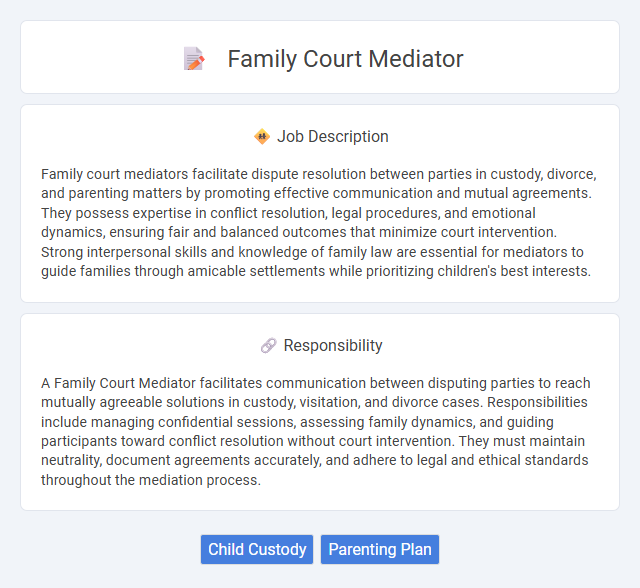
Family court mediators facilitate dispute resolution between parties in custody, divorce, and parenting matters by promoting effective communication and mutual agreements. They possess expertise in conflict resolution, legal procedures, and emotional dynamics, ensuring fair and balanced outcomes that minimize court intervention. Strong interpersonal skills and knowledge of family law are essential for mediators to guide families through amicable settlements while prioritizing children's best interests.
People experiencing high levels of emotional stress or conflict may find the role of a family court mediator particularly challenging due to the need for impartiality and emotional resilience. Individuals with strong communication skills, patience, and the ability to remain neutral under pressure are more likely to be suitable for this profession. Those who thrive in conflict resolution and enjoy facilitating cooperative solutions between disputing parties probably have a higher chance of success in this role.
Qualification
A Family Court Mediator typically requires a master's degree in social work, psychology, law, or a related field, along with specialized training in mediation and conflict resolution. Certification from accredited mediation organizations, such as the Association for Conflict Resolution (ACR), enhances credibility and employment prospects. Strong interpersonal skills, knowledge of family law, and experience working with diverse populations are essential qualifications for effective mediation in family court settings.
Responsibility
A Family Court Mediator facilitates communication between disputing parties to reach mutually agreeable solutions in custody, visitation, and divorce cases. Responsibilities include managing confidential sessions, assessing family dynamics, and guiding participants toward conflict resolution without court intervention. They must maintain neutrality, document agreements accurately, and adhere to legal and ethical standards throughout the mediation process.
Benefit
Family court mediators likely provide a vital benefit by facilitating communication between disputing parties, which can reduce the emotional strain and cost associated with lengthy court battles. Their role probably increases the chances of reaching amicable agreements that prioritize the best interests of all family members involved. This mediation process might also enhance the efficiency of the legal system by lowering caseloads and promoting faster resolutions.
Challenge
Family court mediators probably face challenges navigating emotionally charged disputes between parties, requiring strong conflict resolution skills and impartiality. Managing high-stress interactions while promoting collaborative agreements may demand exceptional patience and empathy. They are likely to encounter complex dynamics that test their ability to balance legal guidelines with the emotional needs of families.
Career Advancement
A Family Court Mediator plays a critical role in resolving disputes related to child custody, visitation, and divorce settlements through negotiation and communication facilitation. Career advancement opportunities typically include progressing to senior mediator positions, specializing in complex cases such as domestic violence or high-conflict custody battles, or transitioning into roles like family law consultancy, judicial clerkships, or mediation program management. Gaining certifications from recognized organizations, pursuing advanced degrees in family law or conflict resolution, and developing expertise in psychological or social work aspects significantly enhance professional growth and earning potential in this field.
Key Terms
Child Custody
A Family Court mediator specializing in child custody facilitates negotiations between parents to reach amicable agreements that prioritize the child's well-being. They employ conflict resolution techniques and knowledge of family law to help create parenting plans that support the best interests of the child. Their role reduces court intervention, promotes collaborative decision-making, and ensures that custody arrangements reflect the child's emotional and developmental needs.
Parenting Plan
Family court mediators specialize in facilitating communication between separating parents to develop mutually acceptable parenting plans. These professionals guide discussions to ensure child custody arrangements prioritize the best interests of the child, addressing visitation schedules, decision-making responsibilities, and conflict resolution strategies. Expertise in family law and child psychology enhances mediators' effectiveness in creating balanced and legally sound parenting agreements.
 kuljobs.com
kuljobs.com